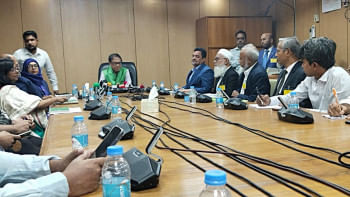Our Lifeline

Murdhanno, Dhaka, Price: 700 BDT
Professor Anwarul Karim, a noted educationist and researcher, is best known to the people within and outside the country as a very dedicated scholar on Lalon Faquir and the Bauls of Bangladesh. He is a folklorist and founded Lalon Academy in Kushtia in 60's with support from local people and the administration. He also founded Folklore Research institute in Kushtia in 1970.
It took several years to complete the work and finally it has been published by Murdhanno. The Ministry of Cultural Affairs funded the project. Initially Professor Karim worked for a monograph on water and culture. It was then funded by the Bangladesh Water Partnership.
Professor Tone Bleie, a noted anthropologist of a Norwegian University made wonderful appreciation of his work. She said, "This new book by one of Bangladesh's most prominent folklorists, cultural historians and educations is a treat for scholars, government officials, development practioners and environment journalists alike. Karim combines passion with a rigorous analytical mind, creating a multi-layered narrative about one of the great riparian civilizations. These intricate pre-historic and historic dynamics are sadly unknown not only internationally, but also among Bangladeshis.
"This book seeks to avoid bombastic and purely mythological narratives of who the early natives were –who over decenniums formed this water abundant and earlier forest-clad civilization. I dearly hope the book will be read by many and help replace ethnocentric myths with new and well –established evidence about the country's rich Pre-Arian past and make us realize that Bangladesh's woes as a lower riparian country should be considered an international issue of mega proportions."
In fact not only Professor Tone Bleie, but also others belonging to Harvard and London School of Economics spoke very highly about Professor Karim's research on water and Culture in Bangladesh. Dr. Phil Parshall, a Merill Scholar of Harvard said about Professor Karim, "He expertly delves into the history of water usage in Sub-Continent. Interestingly, he explores the centrality of water in the religious rituals of Hindus, Muslims and other traditions. Particularly insightful is Dr. Karim's explorations of the life and customs of rural Bangladesh." And lastly, Chris Brown of London School of Economics commented, "I can highly recommend this fascinating book to anyone who plans to travel this often neglected country with so many wonders hidden away."
Karim's book is a unique work and should be widely read, more particularly by the youths as they should know the heritage the country possesses and how these need to be protected or preserved against all odds.
The reviewer is occasional contributor to this pages.


 For all latest news, follow The Daily Star's Google News channel.
For all latest news, follow The Daily Star's Google News channel. 



Comments